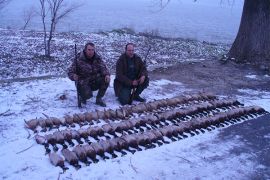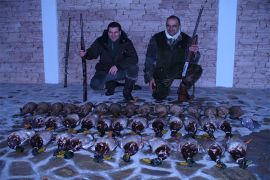

Wild duck hunting trips in Bulgaria - Hunting area Цар Шишманово 3853
Wild duck shooting in Bulgaria - Hunting area Цар Шишманово 3853
Wild duck hunting in Bulgaria - Hunting area Цар Шишманово 3853
Wild duck shooting in Europe - Hunting area Цар Шишманово 3853
Wild duck hunting in Europe - Hunting area Цар Шишманово 3853
Waterfowl shooting in Bulgaria - Hunting area Цар Шишманово 3853
Waterfowl hunting in Bulgaria - Hunting area Цар Шишманово 3853
Mallards hunt in Bulgaria - Hunting area Цар Шишманово 3853
Mallard shooting in Bulgaria - Hunting area Цар Шишманово 3853
Wild duck hunting in Bulgaria
Bulgaria Hunting Trips - Discounted wild duck hunting trips on bghunters.com - Waterfowl hunting area Цар Шишманово 3853
» Bulgaria Hunting Trips » Wild duck hunting in Bulgaria » Hunting area Цар Шишманово 3853
- Hunting trips directly from outfitters:
Wild duck hunting trips in Bulgaria
Hunting area Цар Шишманово 3853
We hunt some of the best areas for Wild duck in Bulgaria!
Wild duck hunting period & methods
Wild duck hunting in Bulgaria season:
- October 1 - January 31
Small game standart price list
Wild Duck
Wild duck is of great importance for hunters in Bulgaria. It is an interesting game species with tasty meat. During the migration there is a considerable number of wild ducks in the whole country and the hunt can be really successful. About 100,000 wild ducks are wintering in the country every year.
Scientific Name: Anas platyrhynchos
Habitat: It is found in both fresh- and salt-water wetlands, including parks, small ponds, rivers, lakes and estuaries, as well as shallow inlets and open sea within sight of the coastline.
Description: The breeding male mallard is unmistakable, with a glossy bottle-green head and a white collar that demarcates the head from the purple-tinged brown breast, grey-brown wings, and a pale grey belly. The rear of the male is black, with white-bordered dark tail feathers. The bill of the male is a yellowish-orange tipped with black, with that of the female generally darker and ranging from black to mottled orange and brown. The female mallard is predominantly mottled, with each individual feather showing sharp contrast from buff to very dark brown, a coloration shared by most female dabbling ducks, and has buff cheeks, eyebrow, throat, and neck, with a darker crown and eye-stripe. Both male and female mallards have distinct iridescent purple-blue speculum feathers edged with white.
Hunting method: Lying in wait, over decoys, walking up
Hunting available in: All areas of distribution in Bulgaria.
Accompanying hunt: It can be combined with Goose hunting.
Hunting services: Standart price list
Bulgaria Hunting Trips | Hunting area Цар Шишманово 3853
- Лов Цар Шишманово 3853
- ✓ Hunting in Bulgaria Цар Шишманово 3853
- Hunting in Europe Цар Шишманово 3853
- Caccia in Bulgaria Цар Шишманово 3853
- Chasse en Bulgarie Цар Шишманово 3853
- Jagd in Bulgarien Цар Шишманово 3853
- Caza en Bulgaria Цар Шишманово 3853
- Κυνήγι στη Βουλγαρία Цар Шишманово 3853
- Bulgaristan'da Avcılık Цар Шишманово 3853
- ✓ Big game hunting in Bulgaria Цар Шишманово 3853
- Red deer hunting in Bulgaria Цар Шишманово 3853
- Fallow deer hunting in Bulgaria Цар Шишманово 3853
- Roe deer hunting in Bulgaria Цар Шишманово 3853
- Wild boar hunting in Bulgaria Цар Шишманово 3853
- Mouflon hunting in Bulgaria Цар Шишманово 3853
- Barbary sheep hunting in Bulgaria Цар Шишманово 3853
- Chamois hunting in Bulgaria Цар Шишманово 3853
- Himalayan tahr hunting in Bulgaria Цар Шишманово 3853
- Bezoar ibex hunting in Bulgaria Цар Шишманово 3853
- Wood grouse hunting in Bulgaria Цар Шишманово 3853
- ✓ Small game hunting in Bulgaria Цар Шишманово 3853
- Pheasant hunting in Bulgaria Цар Шишманово 3853
- Quail hunting in Bulgaria Цар Шишманово 3853
- Turtle-dove hunting in Bulgaria Цар Шишманово 3853
- Partridge hunting in Bulgaria Цар Шишманово 3853
- Wood pigeon hunting in Bulgaria Цар Шишманово 3853
- Woodcock hunting in Bulgaria Цар Шишманово 3853
- European hare hunting in Bulgaria Цар Шишманово 3853
- ✓ Waterfowl hunting in Bulgaria Цар Шишманово 3853
- Goose hunting in Bulgaria Цар Шишманово 3853
- ✓ Predator hunting in Bulgaria Цар Шишманово 3853
- Wolf hunting in Bulgaria Цар Шишманово 3853
- Jackal hunting in Bulgaria Цар Шишманово 3853
- Fox hunting in Bulgaria Цар Шишманово 3853
Wild duck hunting trips in Bulgaria
Small game - Duck shooting in Bulgaria
- Wild duck hunting in Bulgaria
- Цар Шишманово 3853
Wild ducks hunting trips in Bulgaria
Wild duck hunting is one of the coldest and most exciting types of wing shooting in Bulgaria. There are three types of duck hunting. The first kind is at flight, early in the morning and at dusk. The second kind is with fake lures at the resting spots (reservoirs, dams, rivers and runoff water). The third kind is walked up hunting along river banks, canals and streams.
When hunting in the early hours of the morning, the hunters have to be at the hunting spots before dawn. The birds move from ther feeding spots towards the resting spots. Those are normally large dams and high-water rivers. Wearing warm clothes is recommended, but using camouflage coverings is a must, due to the fact that these birds have a sharp eyesight and a very acute sense of hearing. It is a good idea for hunters to use auditory decoys, so as to direct the birds towards themselves. You may use retriever dogs (Golden Retrievers, Labradors, Drahthaarts, Kurzhaarts and Setters). The dogs need to be very disciplined, compliant and to obey the command Stay in place!. Dogs with experience trace the shot birds by themselves and swiftly retrieve them for their guide.
During the hunts at dusk, it is advisable to lie in wait for the ducks at their feeding spots.
Those are: surface runoff areas (overland flow), harvested fields (rice fields), shallow streams, flooded corn fields (grooves filled with water). It is mandatory to use auditory decoys, so as to direct the birds towards the desired places. It is advisable to use retriever dogs, due to the fact that the hunt takes place in the darker hours of the day. For this kind of wing shooting in Bulgaria, using Drahthaars and Kurzhaars brings greater success. They are able to find the shot birds visually as well as by smell, while Labradors and Golden Retrievers tend to track the bird visually and are more suited for hunting at wide open water areas (reflective water surfaces).
Walked up hunting is the second method of hunting ducks. That is an emotion-filled outing involving long hikes, which is why the hunter must be in excellent health. This kind of hunt is most sucessful when the bigger dams in the area freeze over. Smaller canals and rivers do not allow the water to freeze even at temperatures below - 15 degrees. Birds are aware of that and they find favourable conditions to rest and eat. It is recommended to start this type of hunt at 6 am, and it can last until as late as 5 pm. It may then be combined with an evening hunt at dusk. Combined, the two types of hunt can bring wonderful results. During walked up hunts, it is good to use a guide who knows the places where the birds rest during the day. Once you near the resting spots, you need to move quietly and stay low. You need to use the surrounding vegetation as a cover while you approach the birds and use the element of surprise. It’s possible to lift between 20 and 50 birds into the air at one of these spots. When moving along a riverbank or canal, you need a disciplined dog that walks no more than 15 - 20 steps ahead of you. Once you near the resting spots, the dog must obey the command Heel! or Behind me! so as not to lift the resting game birds. In Bulgaria, the most widely established dog breeds are Drahthaar and Kurzhaar. Once the birds have been shot, the dogs must retrieve the birds from water as well as dry land under the command Retrieve!. The dog must be able to maneuvre through obstacles (water obstacles, fallen trees, ponds, etc.) - in other words, it needs to be hardy while retrieving.
The third kind of hunting is by lying in wait for the birds at their resting spots. Those are: large reservoirs (dams), surface runoffs. It is mandatory to use lures (decoys). It is advisable to put between 40 and 100 duck decoys into the water. It is good to have two or three pairs of spinning wing decoys (mojos). You may use mobile duck decoys with electric motors, so as to create the illusion that the birds are moving. The hunters need to have made a temporary hiding place at the river bank. It must blend in with the terrain so as not to arouse suspicion in the birds. A boat camouflaged with reed vegetation can be used for the same purpose. Hunting by boat allows the hunters to choose the hunting spots for themselves. When using decoys in such cases, they need to be mobile, with built-in chords and weights (so that they can be thrown directly from the boat).
Mallard Identification
Male has green head with olive green bill. Wings of both sexes have purplish / blue speculum and white underside. Concentrations of mallards are typically found near agricultural grain fields that are situated near wetlands or river courses. This species nest throughout country and especially in The Danube plain. Mallards typically return to feeding areas so scout your hunting area to locate where the birds are feeding. A mallard call can be quite successful in luring this bird to decoy spreads.
- BOOK YOUR HUNT IN BULGARIA
Чакал
(Lepus europeus)
Срокове на ловуване
Ловът на чакали е разрешен целогодишно.
Групов лов на чакал извън горския фонд - от 1 януари до последния ден на февруари.
Препоръчителни патрони със съчмен заряд за отстрел на чакал
Екипът на БГ Ловци (bghunters.com) Ви препоръчва следните патрони:
- Препоръчителни патрони - 32g-50g за 12 кал.
- № на сачмите - 2/0, 4/0, 6/0, 8/0
- Разстояние - 35-45 метра


